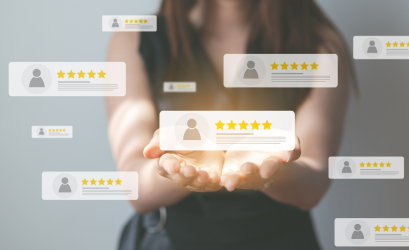
Nasi pracownicy

Instytucje UE przykładają dużą wagę do różnorodności i integracji. Ich pracownicy opowiadają, co to oznacza w praktyce. Z ich doświadczeń osobistych i zawodowych dowiesz się, jak instytucje UE wspierają swoich pracowników w realizowaniu ich potencjału.
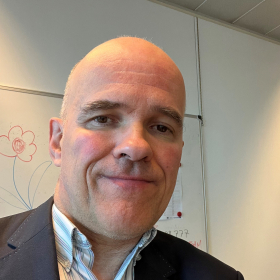
Gino, Responsible for Gender Equality, Human Rights and Democratic Governance - INTPA
“I am Gino from Leuven, Belgium, and I am delighted to introduce myself on this page. Currently, I work in the unit at INTPA responsible for Gender Equality, Human Rights and Democratic Governance as a programme assistant. Born with a disability, spasticity, my life has been a journey of challenging myself and, to a certain degree, my surroundings to achieve my dreams.
As a child, many believed I would never attend university. However, today I can proudly reflect on my accomplishments: a university degree from Leuven, an internship as a Blue Book trainee in the Commission, a master’s degree from the London School of Economics, and passing the AST competition in 2004.
I have always expected the EU institutions to treat me as I am—a curious and enthusiastic EU citizen who sometimes needs encouragement and support to succeed. This expectation has been met throughout my life and career. I have greatly appreciated the Commission's accommodations for my specific needs, such as allowing me to exercise and occasionally work from home.
In return, I bring my energy and passion to this thoroughly stimulating work environment. My next challenge is to become an AD official!
I encourage everybody, to believe that it is possible to pursue your passion, even if the road is different and sometimes cumbersome, is it worth it!”
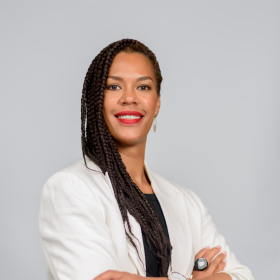
Michaela, European Commission Anti-racism Coordinator
"My name is Michaela and I am the European Commission Anti-racism Coordinator. Working for the European Commission has deepened my commitment to public service. Every day, I have the opportunity to contribute to policies that strive to reflect European values of human rights, equality and freedom with the aim of uplifting all Europeans, whether addressing inequalities in education, advocating for inclusive digital transformation, or amplifying marginalised voices in policymaking. True public service demands more than good intentions, it requires confronting systemic gaps. As a Black European woman, I’ve felt both the honour and the weight of representing communities often underrepresented in EU spaces. I’ve found strength in turning these gaps into opportunities for change. Initiatives like the EU Anti-Racism Action Plan remind me that progress is possible when institutions prioritise equity as fiercely as they preach it.
Europe’s strength lies in its diversity, and diverse voices are vital to shaping a Union where everyone belongs."
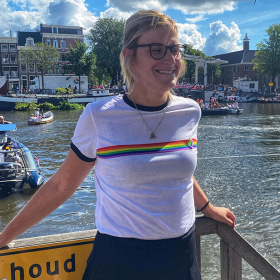
Aleks, finansistka
“I am Aleks (she/her), and I work as a Financial Officer at the European Commission’s Directorate-General for Budget (DG BUDG). My main responsibilities are in the areas of EU Green Bond financing and Asset Management Coordination. I’m also a member of the Commission’s Task Force on Equality.
Colleagues in my unit, including the Head of Unit, who were the first to be aware of my gender identity, were very supportive and understanding of my transition. Eventually, when the whole directorate became aware of my identity, I can confidently say that I have not had a single bad experience but rather found support and ‘kind curiosity’. I also prepared some materials on transgender issues with senior management, an initiative that was very well accepted by all. Transgender people can find a safe working environment in DG BUDG. Challenges remain, of course, especially when it comes to recognition and digital administrative systems, but positive changes are coming and I am happy to see and be part of various internal task forces and groups working on how to further improve current systems.
There’s a long path ahead but we are on the right course. I believe transgender people will be warmly welcomed in any team in the Commission.”
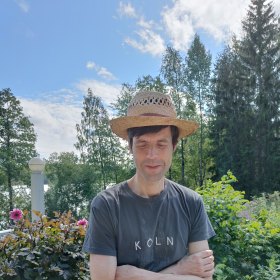
Ville, urzędnik ds. prawnych
"Hi,
I am Ville, legal officer in the Commission’s Directorate-General for Health and Food Safety and blind since my birth.
For me working for the EU Institutions was a dream and succeeding it seemed so unlikely that I almost never tried.
But with the encouragement and support of those closest to me, I did - and now I have been working here since 2013. If I could do it, why couldn't you?
However, there is no prize without effort. Make sure that your professional skills match the job you are applying for and find out as much as possible so that you are prepared for each step.
Think what you can give to the Institutions instead of what they can give to you, be honest about your disability if you have one and any special needs.
Think proactively about how to cope with any issues the disability could cause in your work as smoothly as possible.
Show that you have the competences, knowledge and initiative to be entrusted with the responsibilities of the job. Be motivated and show it. It may sound a lot and it is indeed a bit unfair.
As persons with a disability we need to be even better prepared than others, not to admit it would be dishonest, but it is possible, you can do it!"
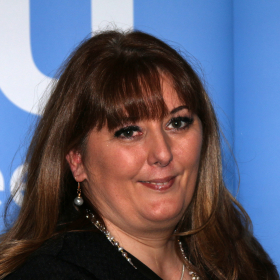
Krystle, asystentka ds. komunikacji
"I am Krystle and I work as a communications assistant at the European Commission in Brussels, I have reduced mobility and I have been working for the European institution since 2002.
I highly recommend applying! No physical handicap is an obstacle, competitions are based on knowledge, not a marathon. Everyone is accepted, nationality, color, gender, physical disability, ... nothing is an obstacle. All EU nationalities from all horizons are represented, the difference is positive. Maltese PRM or Estonian visually impaired, it has no importance. Multicultural means working with others, without making any distinctions. The Institutions have set up services that welcome all types of people, equal opportunities are a real right."
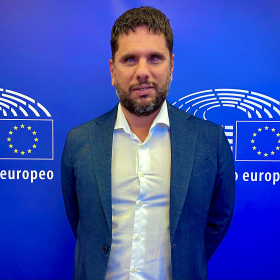
Maurizio, rzecznik prasowy
"I am Maurizio, I am the Head of the European Parliament's Liaison Office in Milan. I am blind and I have been working for the EU institutions since 2015, when I started my European career as press officer.
My everyday work consists in dealing with different audiences of Italian citizens – media, youth, students, stakeholders, businesses – in order to raise awareness on European Parliament functioning and activity.
I never had problems because I was disabled. I don’t feel any obstacles. If you have a positive attitude, even if people are ignorant or sceptical, if you’re keen on sharing your experience, you can break walls."
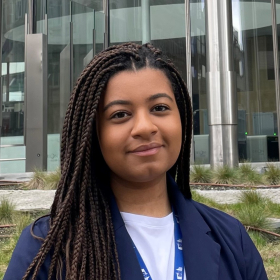
Joséphine, Policy assistant
“My name is Joséphine, and I work in the Secretariat-General of the European Commission, focusing on combating racism and discrimination. As a young racialised woman, joining the EU institutions has been both a personal and professional journey towards inclusion and representation. I started as a Blue Book trainee back in 2023, unsure of how my identity as a racialised LGBTIQ person would fit into the institutions. What I found was a diverse and dynamic environment where different perspectives are valued, and where I could actively contribute to shaping policies that promote equality.
Today, I have the privilege of working on crucial issues to ensure that the voices of marginalised communities are heard at the highest levels. The EU’s commitment to promote a Union of Equality is not just a principle, it’s something I experience every day through the support of my colleagues and the real impact of our work. As a young professional, I feel empowered to grow, and help build a more inclusive Europe. If you’re looking for a career where you can be yourself and drive meaningful change, this is the place to be.”
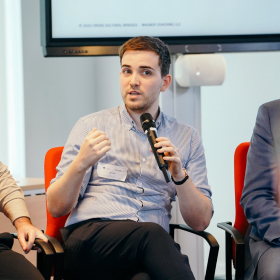
LGBTIQ staff member
"I am Diogo and I work as a programme manager at European Social Fund Plus(ESF).
I was 21 years old when I had my first office job. Then, still at the private sector, I was not out at work and for a few months I made a point of it. With time, I gained more confidence in myself and since then I am proudly out to my colleagues. Why? Because it is not possible or admissible for me to live a double life. I started working for the European Commission in 2020 and my attitude was no different: I am open about myself and my family since the first day, and always felt welcomed. My work in the LGBTQI+ staff association Égalité made me realize that my experience is not true to everyone, and many colleagues still don’t feel comfortable in being their whole selves at work. Since I started I’ve seen direct policies to combat queerphobia and to make LGBTQI colleagues feel safe. There’s still work to be done, but I am happy to work for an European institution where the internal efforts match the external public policies put forward. And because I want all new comers to feel as safe as I did here, I will continue to push for more LGBTQI awareness and inclusivity.”
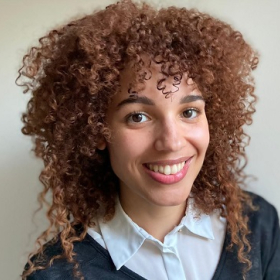
Alice, learning, development, well-being and DEI assistant, Co-President of Diversité Europe
“I’m Alice and I work for the Greens/EFA in the European Parliament as a learning, development, well-being and DEI (Diversity, Equality and Inclusion) assistant.
I am also the co-President of “Diversité Europe”, the Inter-institutional staff association whose one of the main objectives is to raise awareness of ethnic and racial diversity and promote the inclusion of all staff in all categories and at all career levels within EU institutions and bodies.
What makes EU institutions extraordinary is people with ordinary dreams working there. I genuinely only wanted to grow old in a Europe where equity, equality and inclusion are also a reality for people like me, and not anymore a promise only. I would really encourage people from diverse backgrounds to join the EU institutions to ensure that we leave to the next generation a European heritage we can all be proud of.”
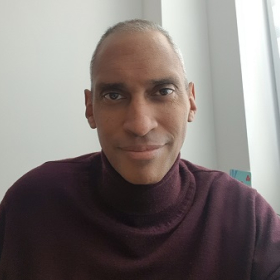
Stephane, responsible for defining and delivering services to researchers
"I am Stéphane, I work at the Directorate-General for Research and Innovation. I am responsible of the unit in charge of defining and delivering services to researchers everywhere in Europe, to help them turn the results of their research work into new products, services, and knowledge useful to our local, regional, or national public authorities.
I was born in Marseilles with French, German and Senegalese origins (at least as far as I know!). I’ve always felt very attracted by the European project, and I’ve always had the chance in my professional career, before joining the Commission, to stay safe from racism and discrimination. So, I did expect neither more nor less than being treated as any other European citizen in this institution, which is the feeling I’ve got throughout this fantastic professional experience”.
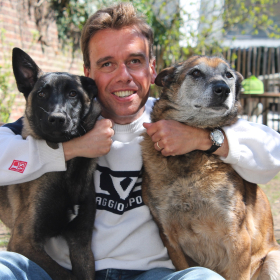
Frederic, pracownik OIB odpowiedzialny za dostępność dla osób o ograniczonej sprawności ruchowej
"I am Frédéric and I 've been working for the EU institutions since 1998. I used to be in charge of accessibility for people with reduced mobility at the OIB (the European Commission's office for infrastructure and logistics) for many years.
I am currently working at the Diversity and Inclusion Office at the DG Human Resources and Security (EU Commission) as a policy officer specialising in disability and mainstreaming accessibility initiatives across learning and development, outreach and communication.
The handicap is an advantage here! I present it in a joyful way. I do not give the impression of dragging all the misery of the world behind me. And because I have a dog, it helps, it is the mascot."
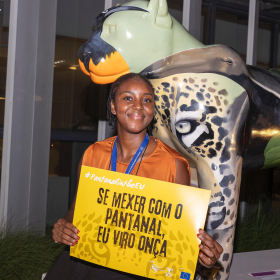
Mariama, policy officer – EU Delegation to Brazil
"My name is Mariama, and I am currently working at the EU Delegation to Brazil as a policy officer. Delegations and Headquarters both offer a stimulating and cosmopolitan workplace. I have always been fascinated by the diverse profiles of my colleagues - being their professional, educational, linguistic or personal background. This diversity proves that one can pursue different career paths within the EU institutions according to one’s interests and a plethora of issues.
With a minority and/or an intersectional background, we can easily struggle with the imposter syndrome and question whether we belong to a certain place. Because you cannot be what you do not see, I truly believe in the power of representation and role models at all levels. As Claire Marin puts it : « Plus une place est désincarnée, imaginaire, moins je peux espérer l’occuper, l’habiter ». Thus, if people can witness that there are actually EU staff « like them », EU careers could have a stronger appealing effect.
No matter our background(s), we are daughters and sons of Europe, one should never hesitate to take opportunities to contribute to the European project!"
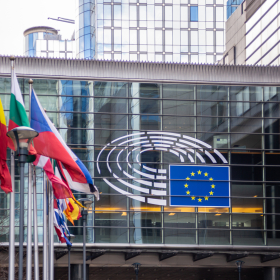
Fabio, kierownik działu
"I am Fabio and I am the head of unit at the European Parliament's Directorate of Human Resources. I have been working for the European institutions since 2001.
I have an amputated leg. We must not be afraid, we must give ourselves the means to face a new situation. Do not go in the dark, come here and think that everything will be fine and that the Parliament will take care of everything. No institution in the world will be able to take care of everything. Preparing for a new environment is especially applicable for people with disabilities. Someone with a disability already knows that they have to approach things differently... prepare themselves differently too."
